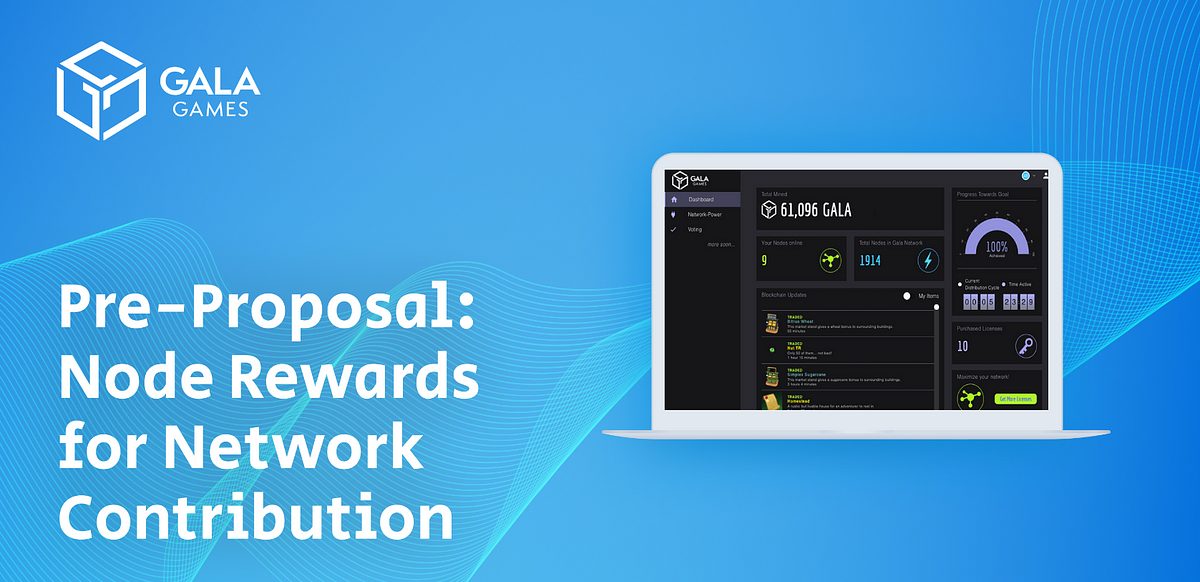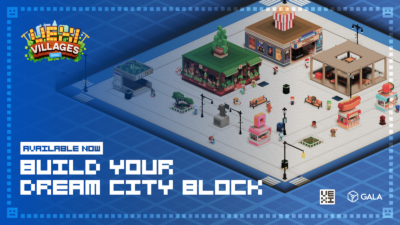
The Gala Games Team has been hard at work driving towards ever-greater decentralization of the Gala Games Node Ecosystem. Today, we would like to present a proposal to the community for discussion. This post summarizes the current node reward structure and proposes a change.
TLDR: Below we lay out a potential scenario for node rewards that will better enable the node network to support the whole Gala Games Ecosystem. The more you contribute and the more stable that contribution, the better the rewards.
Legal Exemplar Disclaimer: This proposal has been created to spark discussion in the Gala Games community. Based on the input that Gala Games receives, this may or may not reflect the final proposal presented to the nodes for a consensus vote.
Now, without further delay, node development can best be broken into three “levels”:
Current State (Level 1)
We are still in the early phases of the Gala Node Network, with approximately 55% of the 50,000 total Founder’s Nodes already sold. In these early months, it has been very important to facilitate the growth of the Node Network by encouraging the community to spread the word and bring more people to join us in what we are doing. In this time, the primary function of nodes has been to ensure Node Operators are active and aware of the importance of being involved in the Gala Node Network. This has been accomplished by giving the same 1 point distribution to all Node Operators who keep their nodes online at least 25% of the time.
In this phase, referrals have been enjoying roughly 10% of the amount rewarded to Node Operators.
- Referral Bonus (one-time per node): 10 points
- Referral Bonus (recurring per node): 0.1 point
- Daily Points per Node: 1 point
There have been many concerns raised about the long-term effectiveness of this plan, which is why we believe a phased approach is necessary to reach the full potential of the Gala Node Network.
Next Phase (Level 2)
In the next phase, the Gala Node Network will begin hosting content for the Gala Decentralized Content Delivery Network (Gala DCDN). To facilitate this rollout there will not be strong hardware requirements, but there will be a minimum required.
Rewards will be based on reaching the minimum hardware requirements and scaled by uptime. Additional points will be given for providing stability for the network in the form of static IP addresses with open ports.
The purpose of these changes is to reward node operators for establishing a stable baseline for the Gala Node Network in preparation for Level 3.
- Level 2 points will be in addition to Level 1 points.
- Points will be calculated to 1 decimal place and rounded down.
Minimum Requirements:
- 50 GB Disk Space
- 4 GB Ram
- 2 CPU Cores
- 10 Megabit upload network connection
Points per Node uptime calculation: 10 Points * [Uptime%]

Points for stability calculation:
10 Points * [Uptime%] * Max([Qualified Nodes] — Abs([Unique IPs] — [Qualified Nodes]), 0)

Note: Nodes shifting between IPs will affect the stability of the network, so daily unique IPs in excess of the Qualified Node count will cause a reduction of points.
This means that the total number of points possible for a single node that is up for 24 hours and does not have a public IP is 11 points. (1 point for Level 1, 10 points for level 2)
This means that the total number of points possible for a single node that is up for 24 hours and has a publicly available IP is 21 points. (1 point for Level 1, 20 points for level 2)
Dealing with Potential Bad Actors
As the network scales up and provides more important services, it becomes critical for the network to be protected from bad actors. As part of Gala Game’s curator role for the network, Gala Games proposes that Gala Games and its partners (those utilizing the Gala DCDN) will monitor the network for any bad actors who attempt to falsify contributions, availability, performance, or otherwise defraud the network. Gala Games and its partners will also welcome reports of any suspected fraud and will research it accordingly. Ultimately, it will be up to decentralized action by the node network to enforce any penalties. A more detailed “bad actors” proposal will be provided to the nodes before any enforcement actions are taken. It is likely that said proposal will include the punishment of loss of DCDN and/or stability points for a period of time.
Future Phase (Level 3)
Level 3 is still being planned, but the suggested implementation is to have a set of workloads that Node Operators can select to have their node perform work for. Each workload will have:
- Suggested minimum requirements
- Performance Criteria
- Associated reward points
Reward points for a workload will change over time to allow the network to prioritize what is most needed. Each node operator may select which workloads they would like their node(s) to handle. Each workload will “Level Up” to its maximum earnings. This is to prevent nodes from rapidly switching workloads in an attempt to earn the most money which would impact the stability of the network.
Example Workloads:

Urgent Workloads:
In cases where there is an urgent need for a workload to be supported by nodes there will be a limited number of positions opened up where nodes will be able to accept the workload and immediately receive full points.





